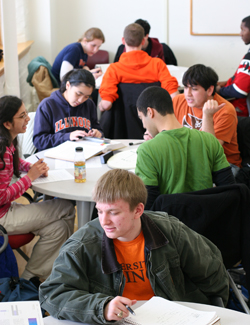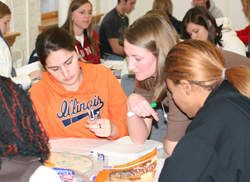Overview
The Merit Program is a challenging program for a select group of undergraduates. To be invited into the program, students must have high academic potential and be committed to excellence. One of our main goals in the Merit Program is to develop a community of scholars among the Merit students. The students in our program work together to solve difficult course problems, develop friendships based on common academic interests, and inspire each other to maintain a high level of commitment to excellence.
VIDEO: ILLINOIS MERIT PROGRAM
Active Learning
 Learning chemistry is not a passive activity in which students absorb facts from a teacher as a sponge absorbs water. Merit students are responsible for learning chemistry through active participation in both the teaching and learning process. In order to "think like a chemist", students must learn to solve complex problems by understanding the fundamental concepts of chemistry, not simply using algorithms to get correct answers.
Learning chemistry is not a passive activity in which students absorb facts from a teacher as a sponge absorbs water. Merit students are responsible for learning chemistry through active participation in both the teaching and learning process. In order to "think like a chemist", students must learn to solve complex problems by understanding the fundamental concepts of chemistry, not simply using algorithms to get correct answers.
To achieve this level of understanding, students learn from a variety of sources:
- Lecture- to obtain an overview of the concepts
- Text reading - to obtain the details of concepts and samples for solving problems
- Homework - to practice solving problems individually
- Discussion sections - to interact with other students and instructor to learn concepts and problem-solving.
How does the Merit Program fit into chemistry courses?
The Merit Program focuses on active learning in discussion sections with other students. Merit students attend the same lectures, do the same assignments and labs, and take the same examinations as all the other students in their courses.
How does the Merit Program differ from traditional approaches?
In place of hour long discussion sections, Merit students attend 2 hour workshops. In some courses (without discussion sections), Merit students attend an additional 2 hour workshop. In place of the traditional classroom, large tables form natural areas for discussions by students. The Merit facilitator provides a challenging worksheet for students and circulates around the classroom providing feedback to students as they work. Students are encouraged to "talk chemistry", and think aloud, while interacting with other students. Different groups of students are encouraged to compare answers since few direct answers are provided by the facilitator. This collaboration among students stimulates additional interactions and more thinking about course content. Workshop problems are based on the material covered in lecture but they are designed to stretch each student's abilities to the fullest extent. The students spend most of the workshop time collaborating in groups grappling with difficult ideas and problems. Active learning produces a thorough understanding of the concepts and an unusual level of creativity. Our students usually perform better in their courses than students in traditional settings.
What are the benefits of the Merit Program?
 Learning to struggle with difficult ideas and problems in an atmosphere of trust and respect is the foundation for success in both graduate school and the corporate world. Merit students learn to exchange ideas and work together with colleagues to understand concepts and solve problems as part of a team. This provides a community of scholars to support and encourage success in later courses. Merit students often form lasting study groups which extend to other courses beyond chemistry. Merit students also gain confidence in expressing themselves and in their abilities.
Learning to struggle with difficult ideas and problems in an atmosphere of trust and respect is the foundation for success in both graduate school and the corporate world. Merit students learn to exchange ideas and work together with colleagues to understand concepts and solve problems as part of a team. This provides a community of scholars to support and encourage success in later courses. Merit students often form lasting study groups which extend to other courses beyond chemistry. Merit students also gain confidence in expressing themselves and in their abilities.
What are the frustrations of the Merit Program?
Merit students must study to prepare for each workshop. It is difficult to be an active participant without working before class on homework and struggling with text material. Merit students commit to themselves and the other Merit students to be prepared to both teach and learn during each workshop. The major source of frustration for Merit students is that our facilitators don't provide direct "answers". Merit students continue to struggle with problems and compare answers with others until they attain a true self confidence in their understanding.
How can I get involved?
Contact:
Elise McCarren
Director, Chemistry Merit Program
emccarr2@illinois.edu